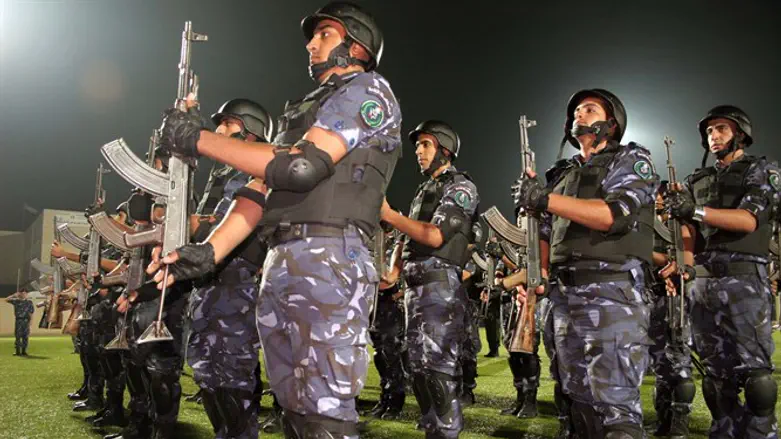
International law expert Dr. Alan Baker, a researcher at the Jerusalem Center for Public Affairs and former legal adviser to the Foreign Ministry, on Tuesday downplayed the Palestinian Authority's (PA) recent acceptance as a member of the International Police Organization (Interpol).
In an interview with Arutz Sheva, Dr. Baker addressed concerns in Israel that the move would result in the extraditing of senior Israeli officials, saying he does not “think that this fear is justified. Interpol has a constitution that establishes in a central clause that one cannot act out of political motives within the framework of Interpol, so any move that is politically motivated will be disqualified. Therefore, I do not share the views of senior officials who are on the defensive."
"The Interpol does not initiate arrest warrants, but rather constitutes a pipeline for the passage of orders that were lawfully issued by a court and are based on evidence," continued Dr. Baker, adding, "The very fact that the Palestinians were accepted to Interpol is a serious act that violates Interpol's own principles.”
"Interpol is open for countries to join, but there is no such country named Palestine. The Palestinians would like to think that they have recognition as a state from the UN, but the UN does not establish states. They do not have the constitutional right to be members of Interpol as well as in the International Criminal Court in The Hague, but these organizations are based on a political majority of states, so an automatic majority usually decides something even if it does not necessarily follow the constitution of that organization,” he explained.
Such a unilateral Palestinian move, opined Baker, is a breach of significant clauses in the interim agreements signed with Israel, and not only does it not bring peace closer, it actually distances it, because Israel is led into a corner where it will have no choice but to say that if the Palestinian violation continues, all interim agreements are cancelled.
"According to international law, if one party fundamentally breaches an agreement, the party that was harmed can see this agreement as void. The Israeli government has decided not to do this because of its own interests, as doing so would result in a legal vacuum that would not necessarily serve our interests,” he said.
In Baker's estimation, the serious parties at Interpol are not in favor of the integration of the PA into the organization.
"Interpol is a very important and professional organization and not a political body, and I am sure that the heads of the Interpol, the serious countries that need the organization and are members of it, are very sorry for what happened because the Palestinians and their supporters have turned it into a political body,” he said, adding that there will be no alternative but to create a compartmentalization that will prevent the leakage of dangerous security materials into problematic hands as a result of the move.
"It is clear that they will have to be overly careful about the security classification of the material and make sure that it does not leak to people who will use it for political or other purposes."
In conclusion, Baker told Arutz Sheva that he remains calm over the PA joining Interpol and, in fact, recommends that all Israelis be calm, because PA chairman Mahmoud Abbas and senior negotiator Saeb Erekat carry out moves such as joining the Interpol simply to see the panic on the faces of senior Israeli officials.
"They know that once they announce that they are going to the Criminal Court or to Interpol every two weeks, the Israelis panic and that's what they want, they want us to be scared. They did it simply because they wanted a public relations achievement."
Dr. Baker also noted that the PA's acceptance to Interpol actually places its own officials at risk of extradition, which they themselves may not have taken into account.
"This is a double-edged sword that endangers them too. I'm not sure they thought about that possibility, and that's what brings me to think that they are not really interested in Interpol's minutiae, but simply in the achievement of being treated as a state. It is a pity that the serious countries, in Europe and the West, did not act to preserve the dignity of their organization,” said Baker.